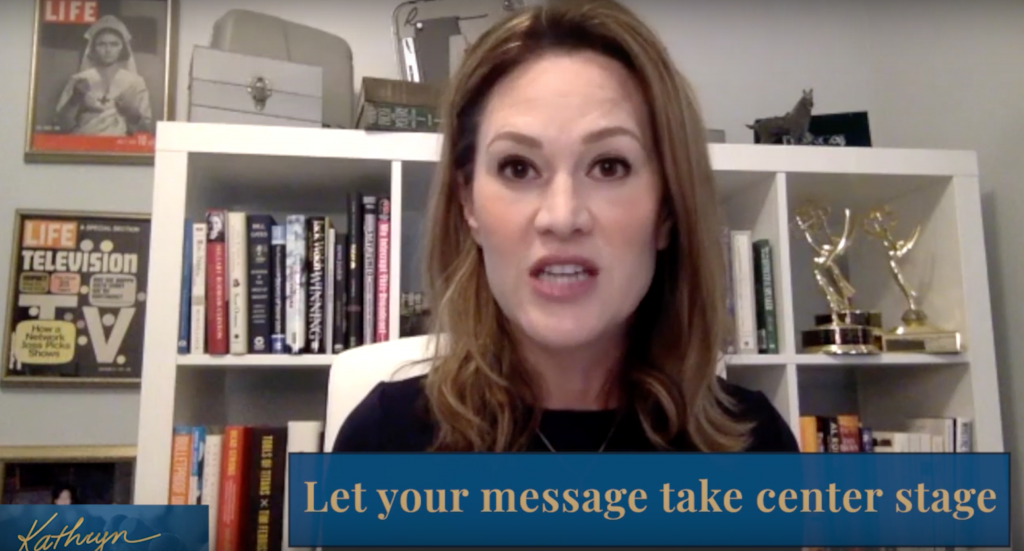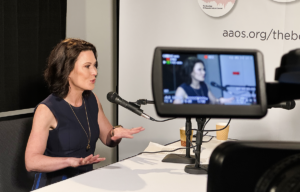People around the world are finding themselves working and conducting media interviews from home for the first time.
The COVID-19 pandemic is forcing many to move their in-person meetings to video conferencing on platforms like Zoom, Skype, Google Hangouts and GoToMeeting. It’s also changing the media landscape. Interviews that used to be done from a studio are now being shot in experts’ living rooms, offices and kitchens.
As a media and public speaking trainer, I teach executives who need to do interviews on TV stations worldwide through video conferencing and who need to reach other live audiences through their computer screen. During my executive coaching sessions, I show them how to represent their business and themselves professionally and also make sure their message sticks with their audiences.
You can make a good impression through video conferencing platforms as long as you have a few specific things in place.
Create a background that isn’t distracting
The key to speaking on stage, in the media, in your videos, during live video conferencing and in job interviews is to keep the audience focused on your message and nothing else. Take a look at the wall or space behind you and make sure nothing behind you is distracting. Look for light switches, outlets, open doors, open windows, and anything else that could be distracting. You want people to remember your content and message, and if there’s a very obvious picture or book behind you that grabs the viewers focus — remove it. You don’t want anything in the background distract from your message, or worse, offend your audience.
Good lighting is your best friend
When you are selling your company, your brand, a product or service – you want to be seen in the best light. Literally and figuratively. When you show up in a media interview or in a meeting and you are poorly lit or there are lots of shadows on your face, the audience can subconsciously feel like you’re hiding something. That you can’t be trusted. The majority of your message is your physical content. This is why what you do and your appearance is just as important, if not more, that what you say. Lighting is vital to the way you appear on the screen. Make sure there are no windows behind you. The lighting needs to be in front of you. Natural light from a window is the best. If you don’t have a room that works for this, use soft lighting from a lamp and place it right in front of you without creating shadows from your monitor or phone. I’ve used this light from Amazon for years. It’s under $100 and many of my clients use it for their media interviews.
Make eye contact with the camera
Just like in person, you want to make great eye contact with your audience. When you’re video conferencing, this can be tough. The software will show you speaking on your monitor, along with the person interviewing you – or all the people you’re talking to on the call. This can create a lot of distractions for you. The key here is to make sure when you are talking, you look into the camera on your computer or phone. When you look directly into the camera, you will be appearing as if you’re looking right into the eyes of your audience. This takes practice to get it down and not let your eyes wander off and look at all the other people on the call. Why is this so important? When you let your eyes move from person to person or somewhere else in your room, you may appear to be insincere, detached, uninterested, insecure and even shifty. Make time to practice good eye contact. You do not want to portray the message that you don’t care about the meeting or interview.
Be camera ready
Working from home means you may not have to put a lot of focus on what you’re wearing on your lower half, but you need to make sure that from waist up, you’re all business. Take the time before an on camera meeting to do your hair, makeup and wear something that is not too distracting. For on camera media interviews through video conferencing, my clients normally have their makeup and hair professionally done. During a pandemic, you can’t hire someone to come to your house to get that done. There are many consultants who can talk you through this virtually right now. Our team of makeup and hair stylists is doing this for our clients. If you don’t have a professional to help you, make sure you look well-rested, alert, your skin looks healthy and your best features are emphasized. Since you want your audience to lock-in with your eyes and trust you – make sure your eyes are not blocked by extra hair and eyeglass frames that don’t fit your face properly. A lot of professionals are balancing children at home and working — so both men and women can benefit from a little concealer under their eyes. Make sure your hair isn’t distracting and falling into your face during your calls and try not to adjust your hair or touch your face while you’re on camera. When it comes to wardrobe, it’s better to wear a solid color or something that’s not as distracting. If you have a bold or quirky personality and you love bright colors and patterns, it’s okay to be yourself, just make sure you don’t distract from the conversation.
Position the camera at eye level
Before you jump on a call, make sure the audience will not be looking up your nose or at your ceiling. We’ve seen a lot of these kinds of calls and interviews! Make sure you’re going to appear to your audience at the angle they’re used to seeing you from across a table. Adjust your computer so it’s at eye level by adding books or something else to raise the computer up a little. Sit upright, in the front half of your chair, and look alert. Do not swivel. Again, you want to pretend like you’re making eye contact with the people on your video conference, so make sure you adjust your computer accordingly so you can look right into the camera when you’re speaking.
Be heard! (and sometimes silent)
If you’re in a virtual meeting with a lot of other people, mute yourself when you’re not talking. You may have kids and/or pets at home right now and a spouse working from home. This is the time to learn how to effectively mute yourself when you’re not talking so the speaker is heard clearly. Also, make sure you shut off your notifications. You don’t want to hear your computer or phone dinging throughout. You also could be taking notes during the call, and you don’t want the sound of your fingers tapping away to distract the others.
Working from home also means creating barriers between your home and the “office.” Make sure to create a good system that will keep you happy, successful and sane during this (hopefully) short period of time where most of us need to work from home.
- Sleep at least eight hours a night. Working from home can create some unhealthy habits like working at all hours of the day/night. Make sure you are getting your personal time to recharge and you’re sleeping. Showing up as your best during video calls and media interviews online while you’re not rested can be a big gamble. You need to be able to answer questions thoughtfully and think quickly. You need sleep for optimal brain function.
- Shower every single day. Start your day with a shower and do your normal morning and evening routines. This will keep you alert and productive. Plus, you need to look good on camera!
- Create 10-15 minute breaks between large blocks of meetings. Stretch, go to the bathroom and eat. You cannot show up looking healthy, trustworthy and likeable on camera if you’re dehydrated, are not sleeping, and you’re hungry.
While working remotely might be a bit of an adjustment, we’re here to help you feel confident and make sure your message sticks with your audience and makes them ACT.





